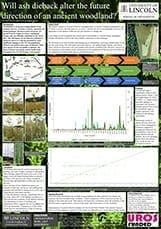By Abbie Edwards //
 Taking part in a summer research project has given me the experience I needed to decide whether a career in field research is for me; and it defiantly is. This opportunity has been incredibly important for me to be able to make these kinds of decisions as I’m entering my final year of study.
Taking part in a summer research project has given me the experience I needed to decide whether a career in field research is for me; and it defiantly is. This opportunity has been incredibly important for me to be able to make these kinds of decisions as I’m entering my final year of study.
Our 8-week project was dedicated to finding out if ash dieback (a fatal fungal disease of ash trees) would change the future direction of an ancient woodland. We carried out our research in Treswell Wood in Nottinghamshire, which is dominated by ash and oak trees. Interestingly, in 2013, a unique experiment at the wood began, to observe how rapidly components of the woodland could recolonise a neighbouring area of arable land. We recorded ash saplings in the piece of arable land and in the woodland to investigate the effects of ash dieback.
Data collection was carried out at the beginning of each week and data processing and sharing of the findings would be done by the end of each week. Regular meetings at Treswell would take place to discuss and review how the project was progressing. Deciding on our sampling methods was a brilliant opportunity for me to understand how field research is conducted. Gauging what was possible to complete in a relatively short time was challenging and a constant reviewing of the project was essential to ensure we chose to collect the most meaningful data.
With each week, my ability to carry out research independently grew. I was encouraged to share my thoughts and ideas on other variables that could be measured to explain our results and found this extremely rewarding. Working alongside my supervisor, Dr Michael Gillman, was a brilliant opportunity to have an insight of what carrying out research entails. Having a lecturer ask a 2nd year student on their opinion and ideas about a project was not only surprising but extremely encouraging for me to think for myself and grow confidence as a young scientist.
Working alongside conservation organisations like the Nottinghamshire Wildlife Trust and getting to work with experienced and passionate people is a fantastic environment to be in. At first, I was surprised at how the project was not planned in fine detail too far in advance, but quickly came to realise this is because fieldwork has its own pace and having flexible plans is essential when performing research out in the field.
What I loved most about this project was its uniqueness. Collecting data in the wood that hadn’t been looked at before gave me a great feeling of excitement and drive to discover something unknown. I hope our findings can be used to predict the future direction of this ancient woodland and further afield across the UK where ash tree populations are threatened. Ash is a keystone species in many ecosystems and its loss will disrupt many environments; from species dependent on ash to survive to industries that produce sports equipment from ash timber.
*To view Abbie’s project poster, please click on the thumbnail below:
